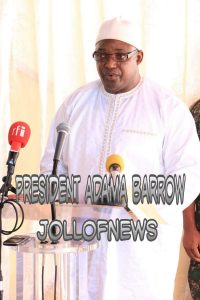 (JollofNews) – President Adama Barrow Tuesday launched the Gambian government’s Security Sector Reform project at a ceremony held at his office.
(JollofNews) – President Adama Barrow Tuesday launched the Gambian government’s Security Sector Reform project at a ceremony held at his office.
Speaking at the ceremony, Mr Barrow said: “When my administration was sworn in last January, it was clear to us that we were taking over a security sector that had been deeply politicised and not responsive to the needs of our people.”
He said the reforms initiated are to ensure an effective and accountable security sector under democratic control with full respect for human rights, the rule of law, and fundamental principles of good governance.
President Barrow noted the importance of reforming and transforming the country’s security sector into a functional and effective one that delivers for the good of the Gambian people. “The security sector reform process will enable us to once again take charge of our own security and destiny.”
The UN Secretary-General’s Special Representative, Dr. Mohamed Ibn Chambas, commended the government’s initiative to embark on this important political process, and renewed the UN’s commitment to support this endeavour along with other partners.
He explained that the security sector reform process ought to be inclusive and participatory, with the aim of making justice and security institutions accessible and responsive to the needs and rights of all Gambians.
ECOWAS Ambassador to The Gambia Vabah Gayflor said ECOWAS was proud of President Barrow and the efforts of his administration in the restoration of democracy in The Gambia.
She added that The Gambia could not afford to fail, and that when its security sector reform is implemented, it would serve as the security sector reform template to follow in Africa. She concluded that there was a lot of work to be done with limited resources, and urged partners to fulfill their promise to The Gambia.
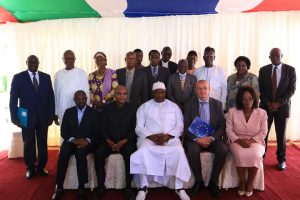 EU Ambassador Attila Lajos said security sector reform in The Gambia faced deep-seated challenges after 22 years of a repressive regime. He added that the country’s stability was important, and reforming the security sector was a key priority to stabilising its democracy and making The Gambia a human rights champion. He noted that coordination and timely sequencing by the partners was of paramount importance.
EU Ambassador Attila Lajos said security sector reform in The Gambia faced deep-seated challenges after 22 years of a repressive regime. He added that the country’s stability was important, and reforming the security sector was a key priority to stabilising its democracy and making The Gambia a human rights champion. He noted that coordination and timely sequencing by the partners was of paramount importance.
For his part, Interior Minister Mai Fatty said President Barrow had set the tone for the future of the security sector when he launched the National Security Council. Minister Fatty stressed that the reform process would lead to the emergence of a professional, ethical and competent security sector. He noted that building an effective governance policy was a complex task but that the government would achieve its objectives and do everything to keep the country safe, stable and at peace. “We will position our country to confront the security challenges of the 21st century and serve the needs of a democratic society,”
The new National Security Adviser, Retired Colonel Momodou Badjie, said a well organised security sector is important for economic development and democratic growth. He noted the challenges in the security sector and called on stakeholders to focus on institutional and organisational reforms.
Mr Badjie noted the importance of balancing defence and the needs of the country, while working with various structures of society.
Supported by the United Nations and other partners, the Security Sector Reform project is an initiative by the Barrow administration to transform the country’s security sector into institutions that are effective, professional and accountable to the state and the people of The Gambia. It will help the government design and implement an inclusive security reform strategy, which will ensure that the security forces accomplish their constitutional mandate and mission, in line with the rule of law and democratic principles of transparency and accountability.
The government has set up a steering committee to provide guidance and oversight of the reform process. It is made up of representatives from relevant ministries, including Defence, Interior, Foreign Affairs, International Cooperation and Gambians Abroad, Finance, Justice, and key security sector reform partners, notably the United Nations, African Union, the Economic Community of West African States (ECOWAS) and the European Union (EU).

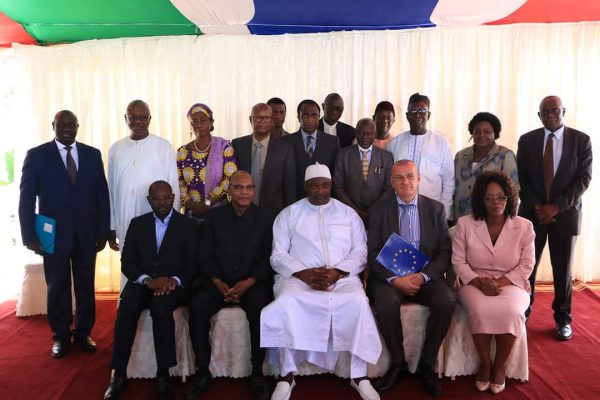
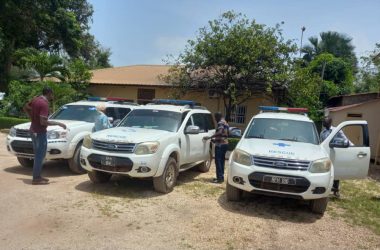
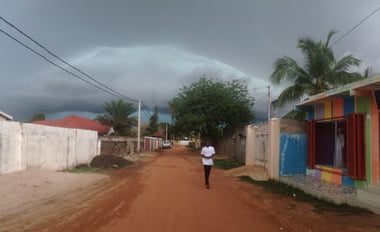


SECURITY FOR ALL OR INSECURITY FOR ALL. IT ALL DEPENDS ON WHAT THE GAMBIAN GOVERNMENT PUTS ITS EMPHASIS ON.
The need for Security is not the issue. No Democractic Dispensation can survive without Tangible Security. The salient questions are: Security for who? By whom? That is, who is providing it? For what purpose or end? The means or methods taken to achieve”Security” is as important as the Security or what is termed Security. The Nature and Scope of the Implementation is as Significant as the Outcome. This is due in part to the fact that if the people who are to benefit from the SAID “Security” do not “buy in” the whole exercise will in time be for Not. There is a tendency for African leaders to Confuse Security with Surpressed Opposition, Anger and Distrust. Security is not the Absence of an Opposition Media, Party or Stronghold of Perceived Political Opponents. It is more the Presence of a feeling of Safety, and General Wellbeing of the Individual and his or her loved ones and property regardless of who they Support, Which Region they live and what ethnic group they belong. It is the Tangible and Practical Experience of the average person (s) and their loved ones, that tomorrow morning will be better than today. That the government will be there for them and their families, friends and neighbors. That the government will provide Reliable Electricity and Water Supply. That the government will provide a Livable and Sustainable Employment, Education, Healthcare and Affordable Housing. Inorder words, Security is not just the Presence of Law Enforcement Officers and Soldiers. If that is the case, Afghanistan, Iraq, Sumalia, South Sudan and Syria would be the most Secured place on Earth. Ok, I know that these are Countries undergoing Civil Strive of one Scale or another. That is precisely my point. The Government and Citizens need to be wary and be very Careful Not to make the mistake many Unstable Countries made. That is, in the name of Security, they ended up with a Militarized Population and Balkanized Countries. Let’s be Security Conscious, but not Security Obessesed and Paradoxically do more harm than good. The type and kind of Security (Alleged threats to the Government from Within and Without), being “hyped” and put out for Public Consumption is Disproportionate to the Reality. On the other hand, the lack of communication, tangible adequate response and emphasis on the Insecurity the average Gambian faces on a Daily basis calls for a Change of Priority while at the same time addressing the Macro level Security. High Crime rates of Murder, Rape, and Property Crimes of recent in the Gambia, is as important and may be even more Concerning to the average Gambian than the one the government is Focused on. If the people are not Secure in their own Neighborhoods, Person or Property, how can the government expect the same people to be the Eyes and Ears of the Government? It is not an EITHER/OR Proposition, where Security is Concerned. It is more of a challenge that needs to be Balanced and always Evaluated for Effectiveness and Outcome. It needs Adjustments and Mitigation as Needed. Above all, the Government needs to Endeavor on its Priorities, Public Service, Delivery of Services, Communication and Public Relations Image. People who are not Supporters of the government should feel as a part of the government as those who Support it, especially, in terms of Service Delivery and Security. Gambia is More than the Sum Total of One Ethnic Group or Region.